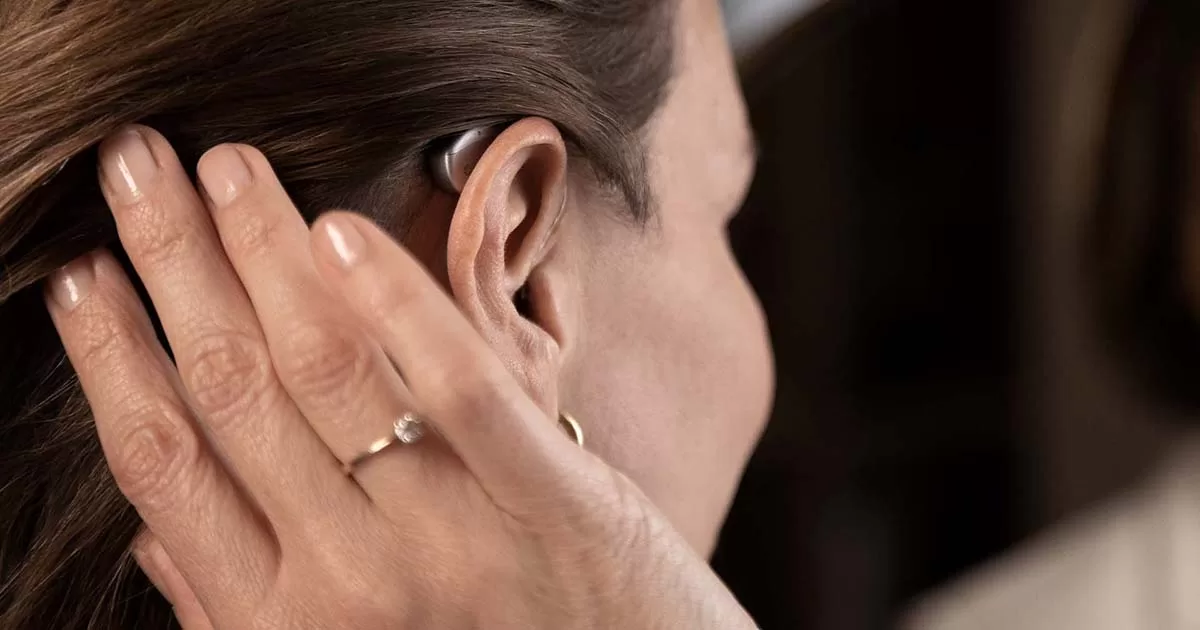Most people who experience tinnitus will notice a common symptom such as buzzing or ringing in the ears. For others, it takes other forms, such as whistling, hissing, heartbeat, music, and many other noises. These symptoms can range from mild to severe, and for some, it can start to affect their daily lives.
Approximately 2 out of 3 australians will experience either temporary or permanent tinnitus symptoms at some point in their lifetime.
This article will discuss some of the common symptoms of Tinnitus. Read on to find out what you can do if you experience them!
Content Navigation
What Is Tinnitus?

Tinnitus is the perception of a sound in the absence of an external sound source. Our patients usually describe it as a ringing, buzzing, swooshing, clicking, hissing, or pulsating sound heard in either one or both ears.
It is generally a sign that something is affecting the auditory system, which comprises the outer, middle and inner ear and the auditory nerve that transmits sound signals from the inner ear to the auditory cortex in the brain.
Tinnitus is typically categorised into two main categories; subjective Tinnitus and objective Tinnitus.
Subjective Tinnitus is the most common form – it is defined by sounds that the affected individual can only hear. It is generally caused by impaired auditory pathways and is common in both sensorineural and conductive hearing loss.
Objective Tinnitus is a more uncommon form of Tinnitus and is also commonly called pulsatile Tinnitus. It is defined as a rhythmic pulse in the ear that is typically in sync with your heartbeat. This form of tinnitus may be linked to more severe medical conditions, and if you are experiencing it, you should see your doctor as soon as possible. Objective Tinnitus can often be identified by your doctor or hearing specialist by putting a stethoscope against your neck or inserting a small microphone into your ear canal, which enables them to hear it.
Tinnitus can be either temporary or permanent and usually increases or subsides in line with the condition causing it to occur. Often, permanent type tinnitus occurs when there is permanent damage.
What Are the Common Symptoms of Tinnitus?
As you are now aware, tinnitus is not a condition in itself but rather a symptom of a condition such as hearing loss or other medical issues.
The symptoms of tinnitus are not always the same from one person to the next and can range from mild to severe in nature and occur in either one or both ears.
Although typically described as a ringing in the ears, the phantom sounds heard by individuals can be present in a number of different forms, such as:
- Buzzing
- Hissing
- Static
- Whistling
- Chirping
- Music
The intensity of the tinnitus noise varies from person to person, and typically, the sound is more noticeable when no other external sound sources are present. For example, people often complain that their tinnitus is most noticeable at night when they are in bed trying to get to sleep.
Patients who experience tinnitus may also experience a tinnitus spike; this is where the intensity of the symptom increases or the tone of the tinnitus changes for no apparent reason. Tinnitus spikes can occur for many different reasons, but more commonly result from increased stress, poor diet, excessive noise exposure, and/or from alcohol or drug use.
Book a FREE Hearing Assessment Today With An Independent Hearing Specialist
When Should I See a Specialist?
Tinnitus occurs for many different reasons and affects individuals in many different ways. Ideally, if you have been experiencing tinnitus for more than 48 hours, we would recommend you seek advice from a hearing specialist or doctor. It is important to diagnose the possible cause of tinnitus to treat the underlying condition and rule out the possibility of any severe medical issues.
Tinnitus itself is not life-threatening. However, the symptoms of tinnitus can cause emotional distress, insomnia, increased anxiety, and other mental health conditions. Managing the patient’s mental health is a vital part of effective tinnitus treatment, and on occasion, consultation with a therapist or psychiatrist may be recommended.
If tinnitus occurs in conjunction with other medical symptoms such as; dizziness, nausea, pressure/fullness of the ear and a further reduction in hearing ability, then it is recommended to seek medical treatment immediately.
What to Expect from the Hearing Specialist?
Tinnitus occurs for many different reasons and affects individuals in many different ways. Ideally, if you have been experiencing tinnitus for more than 48 hours, we would recommend you seek advice from a hearing specialist or doctor. It is important to diagnose the possible cause of tinnitus to treat the underlying condition and rule out the possibility of any severe medical issues.
Tinnitus itself is not life-threatening. However, the symptoms of tinnitus can cause emotional distress, insomnia, increased anxiety, and other mental health conditions. Managing the patient’s mental health is a vital part of effective tinnitus treatment, and on occasion, consultation with a therapist or psychiatrist may be recommended.
If tinnitus occurs in conjunction with other medical symptoms such as; dizziness, nausea, pressure/fullness of the ear and a further reduction in hearing ability, then it is recommended to seek medical treatment immediately.
Book a FREE Hearing Assessment Today With An Independent Hearing Specialist
Treatments Available for Tinnitus
Treatment starts with determining what is causing the tinnitus symptom. The first step is to have a full comprehensive hearing test with a hearing professional who will conduct a thorough case history and perform a hearing assessment to determine the likely source of the tinnitus symptoms.
Unfortunately, there is no magic pill that can be taken to directly cure tinnitus. If the underlying medical issue causing the Tinnitus can be discovered and treated, the overall effect of the Tinnitus can usually be reduced or corrected with treatment. For example, if the Tinnitus is caused as a result of excessive ear wax, then once it is removed, the Tinnitus should disappear. For some, Tinnitus may be permanent, and there are a number of treatment options available to assist with managing the symptom.
Independent Hearing specialises in tinnitus management programs and treatment for all types of hearing loss. Call us today at 08 8004 0077 for a FREE Hearing Assessment with one of our experienced specialists!
Below we have listed some common treatments for tinnitus
Hearing Aids

Tinnitus can often be a direct symptom of hearing loss. When the hearing loss is treated through the use of hearing aids, the tinnitus symptom is often reduced or removed. Typically, in the early stages, the tinnitus is not noticeable while the user is wearing the hearing aids, and over longer periods of time with regular hearing aid use, it can permanently disappear.
Earwax Removal
If the tinnitus symptoms are a direct result of wax occlusion, then the tinnitus symptoms can be removed by reducing or removing the wax. If considering wax removal, it is recommended to seek treatment from your doctor or hearing care professional first to determine the best option for removal. If the procedure is not done correctly, it could further damage the auditory pathway.
Sound Therapy
Sound therapies can be used in order to divert the patient’s attention away from their tinnitus symptoms. They are designed to replace the sounds of tinnitus with another sound that may be more tolerable to the individual. This treatment is commonly used to assist patients in falling asleep, often by playing soft nature sounds in order to divert the individual’s attention away from the tinnitus, allowing them to fall asleep.
Many hearing aids have built-in tinnitus management programs and sound generators that can be utilised as a part of the tinnitus management program.
Behavioral Therapy
This type of therapy primarily focuses on your responses to tinnitus. Behavioural therapy may be beneficial in minimising stress and anxiety associated with tinnitus, as well as improving your general quality of life. Behavioural treatment includes a variety of techniques, such as:
- Cognitive behavioral therapy
- Acceptance and commitment therapy
- Mindfulness-based stress reduction
- Progressive tinnitus management
- Tinnitus activities treatment
Tinnitus retraining therapy (TRT) is another type of behavioural therapy that can assist in reprogramming the way your brain responds to tinnitus. This can assist you in tuning out and being less aware of the sounds. Tinnitus retraining therapy combines counselling, sound therapy, and the use of a noise-generating device such as a hearing aid. However, this therapy will only be effective if you invest sufficient time and effort.
Final Thoughts
As discussed in today’s article, tinnitus isn’t a one size fits all approach, and there are many different types and causes of the symptom. If tinnitus is occurring, it is important to have it assessed by a hearing care professional to determine the potential cause.
Independent Hearing specialises in tinnitus diagnosis and treatment options. If you or someone you know is experiencing tinnitus, we would be happy to assist you with your needs.
Independent Hearing is fully accredited by the government’s office of hearing services program. We provide affordable services to DVA and pension cardholders. Call us right now at 08 8004 0077!














